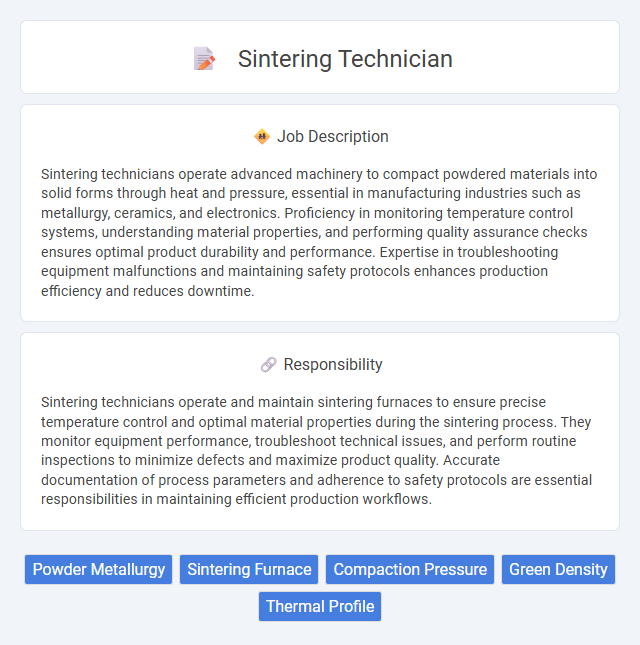
Sintering technicians operate advanced machinery to compact powdered materials into solid forms through heat and pressure, essential in manufacturing industries such as metallurgy, ceramics, and electronics. Proficiency in monitoring temperature control systems, understanding material properties, and performing quality assurance checks ensures optimal product durability and performance. Expertise in troubleshooting equipment malfunctions and maintaining safety protocols enhances production efficiency and reduces downtime.
Individuals with strong attention to detail and the ability to work in high-temperature environments are likely to be well-suited for a sintering technician role. Those who can maintain focus during repetitive tasks and have good problem-solving skills might adapt effectively to the precision required in monitoring sintering processes. People with respiratory sensitivities or difficulties working around heavy machinery may face challenges in this position.
Qualification
Sintering technicians typically require a high school diploma or equivalent, with preferred qualifications including an associate degree in materials science, metallurgy, or mechanical engineering. Proficiency in operating sintering furnaces, interpreting process parameters, and understanding metal powder behavior is essential. Strong analytical skills and hands-on experience with quality control and equipment maintenance significantly enhance job performance in sintering operations.
Responsibility
Sintering technicians operate and maintain sintering furnaces to ensure precise temperature control and optimal material properties during the sintering process. They monitor equipment performance, troubleshoot technical issues, and perform routine inspections to minimize defects and maximize product quality. Accurate documentation of process parameters and adherence to safety protocols are essential responsibilities in maintaining efficient production workflows.
Benefit
Sintering technicians likely experience significant benefits such as skill development in advanced manufacturing processes and increased job stability due to industry demand. They may also enjoy competitive salaries and opportunities for career advancement within metallurgy and materials engineering fields. The role often provides hands-on experience with cutting-edge technology, enhancing professional value in the industrial sector.
Challenge
Sintering technician roles likely involve complex challenges related to controlling temperature and pressure to achieve optimal material properties. The probability of facing equipment malfunctions or inconsistent raw materials requires strong problem-solving skills and quick adjustments. Mastery of process parameters is essential to maintain quality and minimize production downtime in this demanding field.
Career Advancement
Sintering technicians gain expertise in controlling high-temperature processes that fuse powdered materials into solid forms, which is critical in industries such as metallurgy, ceramics, and manufacturing. Advancing in this career often involves developing skills in process optimization, quality control, and equipment maintenance, leading to supervisory or engineering roles. Certifications and continued education in materials science and industrial engineering further enhance opportunities for career growth and higher salary prospects.
Key Terms
Powder Metallurgy
Sintering technicians in powder metallurgy specialize in the controlled heating of powdered metal materials to form solid, durable components through diffusion bonding. They optimize parameters such as temperature, atmosphere, and time to ensure material density, structural integrity, and desired mechanical properties in sintered parts. Proficiency in techniques like furnace operation, process monitoring, and quality control is essential to enhance efficiency and meet industry standards in automotive, aerospace, and manufacturing sectors.
Sintering Furnace
A Sintering technician specializes in operating and maintaining sintering furnaces, ensuring precise temperature control and atmosphere regulation for optimal material bonding. Expertise in monitoring furnace parameters, troubleshooting mechanical and electrical issues, and adhering to safety protocols is essential for maintaining production efficiency. Proficiency in analyzing sintering cycles and adjusting furnace settings directly impacts the quality and durability of sintered components in manufacturing processes.
Compaction Pressure
Sintering technicians specialize in controlling compaction pressure to enhance the density and mechanical properties of powdered materials during the sintering process. Precise adjustment of compaction pressure influences grain bonding and porosity reduction, directly impacting the quality and strength of the final product. Advanced understanding of pressure parameters helps optimize microstructure development in metal and ceramic components.
Green Density
Sintering technicians specialize in controlling the green density of powder compacts to ensure optimal structural integrity before the sintering process. Precise measurement and adjustment of green density are critical for achieving uniform shrinkage and preventing defects such as warping or cracking during sintering. Expertise in green density analysis directly impacts final product strength, dimensional accuracy, and overall material performance in metallurgical and ceramic manufacturing.
Thermal Profile
A Sintering technician specializes in monitoring and optimizing the thermal profile during the sintering process to ensure material integrity and performance. Precise control of temperature ramp rates, soak times, and cooling cycles is critical to achieving uniform microstructure and mechanical properties in ceramics or metal powders. Mastery of thermal analysis equipment and data interpretation enhances sintering efficiency and reduces material defects.
 kuljobs.com
kuljobs.com